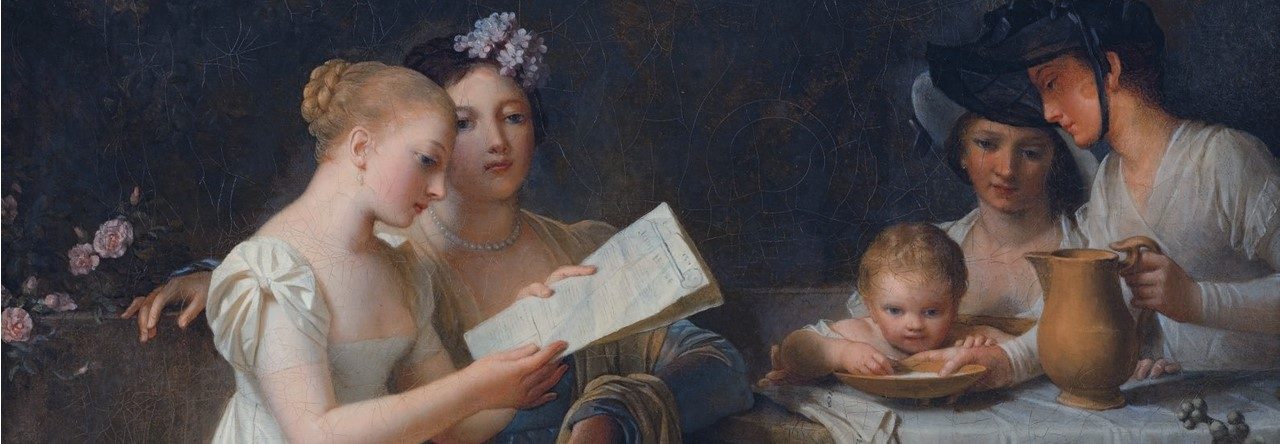A letter from Miss Lucretia Atherton to Mr. Henry Atherton, steward of Viscount Saybrook’s Lincolnshire estate. Brighton, May 1821.
My dear nephew:
If the physician be correct in his prognostications, by the time you read this letter I will be dead. Rejoicing, I trust, along with my Maker, if our Lord can find it in his heart to forgive the mistakes of a woman whose sins lie far in the past. I flatter myself that my keeping of your daughter for all these years—more than ten, now, since the passing of my own dear niece, your wife!—will stand me in good stead as I face my day of judgment.
But now I must return poor Harriot to your care, as it has been her misfortune not to secure herself a husband during these years she has lived with me as my companion. Although the primary purpose in removing her from Lincolnshire was to prevent any unfortunate entanglements with the sons of Lord Saybrook, I did advise you that she would have a far better chance of securing herself a suitable husband if she came to me, rather than stayed with your widowed self. But she has not. Why this should be so, I cannot begin to fathom. She has been taught how to run a small household, and how to best keep its accounts; she has a kind, selfless sort of temperament; and, though not a diamond of the first water, she can be pleasing when she makes a proper effort with her toilette. Surely the demands I placed upon her as my companion could not have so occupied her mind as to it leave it no room for wooing.

Brighton, 1883, complements of Antiquemapsandprints.com
I cannot account it my fault. My political work here in Brighton has often brought us into company with gentlemen of the proper social standing, but Harriot would have none of them. Nor did the sons of any of the local gentry seem to catch her eye, nor she theirs. At least we may be thankful her head was not turned by any in the Prince Regent’s dissolute set, who parade about the town in their ridiculous fashions and dandified airs, preening as if they were peacocks wooing a hen. I do not look kindly on our current King for bringing such a dissolute set to my poor Brighton, even if their patronage has contributed to the economy of the town.
I did think at one time Harriot might harbor a tendre for a young officer whose regiment had been stationed in the town. But despite my continual urging, she failed to bring him to the point, and his regiment left town without his having made the expected declaration. Miss Terpent, Brighton’s most determined gossip, dared to put it about that Harriot had allowed Lieutenant Chamberlayne liberties that no lady ought, but for my part, I cannot believe it of my niece. You can be certain I squashed such ill-bred, groundless rumors as soon as they came to my ears, and no word of such things should follow her home.
I understand from Harriot that you have seen little of the new Lord Saybrook at the estate since the passing of his father. I do hope he continues to spend the bulk of his time in London; it would be a pity to send Harriot away for a decade to avoid an inappropriate entanglement with a boy above her station, only to have the grown man persuade her into a dalliance upon her return. I understand from my friends in the city that your new lord is of a low, dissolute character, particularly in his relations with the gentler sex, and have warned your daughter accordingly.
Although I did think from some remarks Harriot let drop that it was not the heir, but his brother, whom she recalled with some fondness—
Be that as it may. I am at peace, knowing I have done all I could for your child.
I will recommend your soul to your wife when we meet in Heaven, and pray it will be many years before you join us there.
I remain, your dutiful Aunt,
Lucretia Atherton
 About the Book: A Lady without a Lord
About the Book: A Lady without a Lord
Book #3 in The Penningtons series
A viscount convinced he’s a failure
For years, Theodosius Pennington has tried to forget his myriad shortcomings by indulging in wine, women, and witty bonhomie. But now that he’s inherited the title of Viscount Saybrook, it’s time to stop ignoring his responsibilities. Finding the perfect husband for his headstrong younger sister seems a good first step. Until, that is, his sister’s dowry goes missing . . .
A lady determined to succeed
Harriot Atherton has a secret: it is she, not her steward father, who maintains the Saybrook account books. But Harry’s precarious balancing act begins to totter when the irresponsible new viscount unexpectedly returns to Lincolnshire, the painfully awkward boy of her childhood now a charming yet vulnerable man. Unfortunately, Theo is also claiming financial malfeasance. Can her father’s wandering wits be responsible for the lost funds? Or is she?
As unlikely attraction flairs between dutiful Harry and playful Theo, each learns there is far more to the other than devoted daughter and happy-go-lucky lord. But if Harry succeeds at protecting her father, discovering the missing money, and keeping all her secrets, will she be in danger of failing at something equally important—finding love?
Amazon: http://myBook.to/LwoaL
Barnes & Noble: http://www.anrdoezrs.net/links/8262311/type/dlg/http://www.barnesandnoble.com/w/a-lady-without-a-lord-bliss-bennet/1125511438?ean=2940157235338
Ibooks: https://geo.itunes.apple.com/us/book/a-lady-without-a-a-lord/id1184485124?mt=11&at=1001l5aH
An excerpt in which Theo offers Harry a long-overdue apology
“I know it’s not much,” he said, gesturing to the flowers. “But rue is supposed to symbolize regret, is it not?”
“Yes. But how could I ever regret receiving my first bouquet from a gentleman?”
“What? No flowers, ever? Why, those fops down in Brighton must be slow tops, indeed.”
“Slower than you, certainly,” she answered, a smile in her voice.
An even worse thought entered his head. Theo clasped his hands in front of his heart in exaggerated entreaty. “Please tell me the boys of Lincolnshire weren’t as dilatory. An entire field full of meadow rue wouldn’t come close to conveying my regrets if your very first kiss came from my bumbling adolescent self.”
“Best start gathering ye rue while ye may, then, sir,” she teased. “And your sin was even more reprehensible than that. For I’d been nursing the most painful case of calf-love for your brother Benedict at the time.”
Theo groaned. “And instead you got me, the careless, foolish brother. How utterly demoralizing, both for you and myself. But only say the word and I’ll dash off a missive this moment, inviting Benedict back to the family manse so you can exert your feminine wiles on the boy.”
Yes, a sensible plan, that, masterminding a match between his brother and the daughter of his steward. Why, then, did the idea of Harry kissing Benedict make him so ill at ease? And not only, he feared, because he worried Ben’s attentions were fixed on someone else entirely.
“Please, do not trouble yourself,” Harry said with a laugh. “As an old Friesian general of my great aunt’s acquaintance used to say, ‘calf-love, half-love, old love, cold love.’”
Theo leaned an arm against a hay bale. “Ah, found a better swain in Brighton than old Ben, did you? One who gave you no flowers, the dunderhead. But perhaps a few kisses, to erase the memory of mine?”
A small, secret smile lit her face. “No need to worry, sir. Yours is not the only kiss I’ve ever received.”
“Ah, you did have a love in Brighton,” Theo said, struggling to make his tone as light as his words. “So why did you leave?”
Harry bent over his drab little bouquet as if she expected to find some hidden scent amongst its wilting blooms. When she raised her head, that private smile was gone, replaced by one wider, but far more brittle. “Not every kiss leads to lasting love, sir. As I’m certain you are well aware, if even a tiny portion of the tales of your London escapades are true.”
The false cheer in her voice, the way she turned the subject away from herself and back on to him—was not it just like her, to insist her own feelings were of no matter? But she had been hurt by her faithless swain, of that he was certain. Damn the perfidious cur to hell and back.
“Of course not,” he said. “Some kisses are simply for pleasure. And some are to dissipate tension, or anger. Some can even offer comfort. Like this.”
Cupping her nape in his hand, he set his lips against hers, pressing all the solace he could into the simple touch.
He had meant it to ease her cares, but the warmth and stillness of her beneath him seemed to calm him, too. Almost as if the tranquility of the lavender about which she’d sung resided somehow within her.
After a long, quiet moment, he raised his head. Stroking a thumb over her cheek, he gazed into her wide, wide eyes.
“Whoever he is, Harry, he is not worth your regrets. Not if he let you go without a fight.”
Then, before impetuosity and rising lust drove him to demand more, he scrambled down the ladder and out into the starless night.
About the Author

Bliss Bennet writes smart, edgy novels for readers who love history as much as they love romance. Her Regency-set series The Penningtons has been praised by the Historical Novel Society’s Indie Reviews as “a series well worth following”; its books have been described by USA Today as “savvy, sensual, and engrossing”; by Heroes and Heartbreakers as “captivating,” and by The Reading Wench as having “everything you want in a great historical romance.” The latest book in the series is A Lady without a Lord.


Leave a Reply